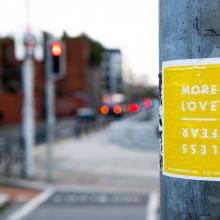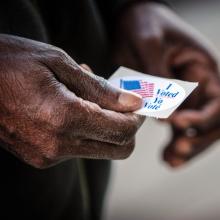Fear
JEWISH NEW TESTAMENT scholar Amy-Jill Levine claims that all religions are a little bit supersessionist. Christian supersessionism — which understands God’s covenant with Christians to nullify God’s covenant with the people of Israel — has been so mainstream throughout most of Christian history that it has hardly required articulating. It was just the anti-Jewish water in which we swam. Following the Holocaust, however, Christians recognized how much we’d weaponized supersessionism into antisemitism, which provided support for Nazi and white supremacist ideologies and perpetuated anti-Jewish violence. Unfortunately, Levine argues, no exegetical maneuver can fully expunge supersessionism from the New Testament — though many have tried. It’s there. And the authority of God’s word in Christian lives keeps its dangerous power ever-present.
Still, Paul’s letter to the church in Rome (which we read this month) contains Paul’s own grappling with these questions. Chapters 9 to 11 — wherein Paul corrects some of the Gentile converts who think God has now rejected the covenant with Israel — comprise the hook on which most contemporary attempts to dismantle supersessionism hang their hat. So, we’ll pay special attention to these.
This isn’t going to be an easy fix — particularly for Christians (like me!) who want to hold fast to the gospel, atone for complicity with antisemitism, and stand in solidarity with Palestinians under occupation. Still, I trust God’s promises: I believe both that God’s covenant with Israel endures and that Jesus is the Messiah. So, this month, we are going to sit with the discomfort of failing while attempting the impossible. Because, in trying, we might find a new way through.
A FEW YEARS ago, I set out to knit a baby blanket as an Advent prayer practice. Knitting is incredibly meditative and allows me to pray with focus and clarity. Knitting a baby blanket seems appropriate as the church awaits the arrival of the “newborn king.” I wish I could say I finished the blanket in time for Christmas. I did not. However, even that seems appropriate, as so much remains unresolved for Jesus’ community at his birth. Their political occupation continued, and even Jesus’ birth story reflects the impositions placed upon his family by the Roman Empire. God’s inbreaking happens under serious duress — but it happens nonetheless.
My favorite lines from the poem “Christmas is Waiting to be Born” by Howard Thurman are: “Where fear companions each day’s life, / And Perfect Love seems long delayed. / CHRISTMAS IS WAITING TO BE BORN: / In you, in me, in all [hu]mankind.”
Thurman reminds us that God was born into our sorrow and among those who are brokenhearted and struggling. That truth is so important to hold on to as we process years of our own collective trauma. No matter how unresolved things are, Christmas is born in us, too! In December we continue our journey through Advent and arrive at Christmas. We might not have received what we’re waiting for by that time, and very little may make sense. Yet, because of who God is, we open our hearts to the improbable, trusting that we won’t be put to shame.
THE PRIEST WALKS into the bedroom to face the little girl. It’s not a little girl, though. Something dark, something other looks out from her eyes. It opens her mouth to spew blasphemies, obscenities. The priest raises a crucifix, shouting, “The power of Christ compels you!”
So goes The Exorcist, the 1973 Oscar winner directed by William Friedkin. As a 17-year-old, I was not prepared for the visceral horror of seeing a possessed young Regan (Linda Blair) serve as the battleground between God and the devil. Neither were my Southern Baptist youth group friends who watched with me in my home. And neither were their parents, who (according to my long-suffering mother) were quite angry that I had hosted this viewing.
On the surface, those parents’ horror is understandable. The Exorcist more than earns its R rating, with gore and a good bit of blasphemy. But sit with Pazuzu (the demon) for a little longer, and it becomes clear that the film aligns well with conservative evangelical politics — a perspective in which I was raised and which persists in many corners of the U.S. church today.
The Bulgarian town where director Ivaylo Hristov’s latest film takes place is never named, but the movie’s title offers a suitable stand-in: Fear. This coastal village on Turkey’s border reeks of terror, but not the kind one might expect.
We must urge Senate Majority Leader Mitch McConnell, who has had Rep. Clyburn’s House-passed bill to address this loophole sitting on his desk for a year, to act. And, for the duration of the pandemic, we must urge governors to close this loophole at the state level to give law enforcement enough time to complete background checks. In doing so, we can save countless lives and prevent countless families from experiencing the suffering and heartache that I feel every day.
I love what Jesus says over and over again, “Be not afraid,” eight times in the New Testament. When I was a little boy, we were told the story of the disciples in the boat. They’re on the boat and the waves are rocking and rolling, and they’re scared. But then they see Jesus coming, walking on the water, and he says to them, “It is I. Be not afraid.”
Our faith is offended by these assaults that contradict the biblical commands to love and protect our neighbors. Our conscience is seared by the lies and strategies of hateful politics that will lead to more and more violence in this country and put the soul of our nation in jeopardy. Words matter and hateful words do lead to violence. Our commitment to our brothers and sisters under attack will lead us to pray, stand, act, and vote against the politics of fear and hate, because of our faith and patriotism.
I see you but you do not see me
I am made invisible by your special powers
Not mine. I have no power.
Your shiny car passes me
It does not have a speck of dirt
But I am filthy
Only my sweat shines at the bus stop
As it did today in the fields
I smell like dirt
I know you are not hungry
Because I see you in your red car
Driving to a fancy restaurant
You do not know I am hungry
Because you cannot see me
I had no lunch today
My belly hurts
But you cannot hear my emptiness
You only hear the music in your car
I see you but you do not see me
Perhaps all of me was left
In the woods where I slept last night
Or maybe the mosquitoes sucked my life away
One by one as they found me on the ground
Because I had no blanket to cover me So I itch. They saw me though you do not.
I dream of home. My mother and my sisters
Hungry, waiting for the money I will send for food.
“America ... you will make lots of money
Our stomachs will be full
And your sisters will have shoes”
I hope my boss pays me this week
I look at my boots
These boots took me 15 days through the desert
Now they will bring me through the fields
And I wonder ...
Is it the car that makes me invisible
Because I see you but
You do not see me
AIDS killed his wife in 2013, and his 13-year-old daughter the next year. And when his flock found out that Mutuse himself tested positive for HIV, the virus that causes AIDS, many abandoned him — and some thought his diagnosis justified the burning of his church.
This wave of Islamophobia has hit hard. Anti-Muslim sentiment was never absent from America. From the time Muslims first came as slaves in the 1600s, there have been times when anti-Muslim attitudes have bubbled over. This is one of those times.
In an interview conducted on Nov. 7, on the eve of the election, and published Friday by an Italian daily, the Argentine pope declined to make any judgment about Trump.
“I do not judge people or politicians,” the pope told Eugenio Scalfari of La Repubblica when asked what he thought of Trump. “I only want to understand what suffering their behavior causes to the poor and the excluded.”
This semester I’m teaching a course called “Faith and Politics” at Emory University’s Candler School of Theology. It’s been a fascinating class for me, and I’m blessed to have very bright students who are required to volunteer for an actual political campaign and keep a journal of their experience.
Their final assignment is to write a paper proposing strategies for healing our divided nation. Our assumption is that all of the major faith traditions have important resources to bring to conflict transformation and reconciling opponents.
There are a few lessons from my class that might be useful for politicians and for the entire nation as we move toward the election.
Sadly, and quite alarmingly, the spirit at the Republican National Convention in Cleveland, Ohio was full of fear, anger, and even hatred. Vitriol often replaced serious public discourse about the most important issues at stake in our public life. I watched every night on television but have also received messages from people on the inside — including friends who are Christian, conservative, and Republican — feeling almost distraught about all three of those core commitments. One friend wrote me to say, “I am close to losing it. The spirit is so angry and hateful here."

Image via Syda Productions/Shutterstock.com
Will we sit and listen to a refugee mother talk about her family’s horrific life in her war-torn country, and realize we’re no longer afraid of her? Will we talk to the gay couple that needs a cake and hear their love story, and feel a bond because it reminds us of our own love story? Will we look into the eyes with the homeless person begging just outside our car window and see another human being in pain, and suddenly feel an urge to help them? Will we make ourselves divinely vulnerable?
In that moment, we reach beyond our fear. We’re finally freed by love. No longer hiding in a tiny room behind a locked door. That. We all need more of that.

Image via Eakachai Leesin / Shutterstock.com
Recently, a friend emailed me that their twenty-three-year-old son had attempted suicide. The young man had been found fairly quickly, but due to the nature of his attempt and his severe depression, he is now in a hospital's psychiatric ward. My friend asked, “How did it get so bad and I didn't know?” She is trying to process guilt and anxiety about what might have happened. Her son is getting the help he needs, but it’s a long journey back to health and wholeness for the entire family.
Speaking slowly at times as he talked about how he is comforted by Scripture and the faith of others, Obama said he has lately focused on a Bible verse from 2 Timothy: “For God has not given us a spirit of fear, but of power and of love and of a sound mind.”
He said now is the best period to have that scriptural assurance.
“What better time in these changing and tumultuous times to have Jesus standing beside us, steadying our minds, cleansing our hearts, pointing us towards what matters,” he said.

gangis khan / Shutterstock
AFTER MASS a few months ago, I asked a member of my parish how her search for a new apartment was going. She said, “I’m so scared where I’m living right now that I went out and bought a gun.”
I was shocked. “I hope you didn’t buy any bullets to go with it,” I quipped. She gave me an eye-roll; I gave her a hug.
Like many Americans (dare I say most)—from President Obama on over—I despair of our country ever regaining sensible gun-ownership standards.
If I had my way, society would have no guns. Period. My motto is: The only way to stop a bad guy with a gun is ... the unarmed cross of Jesus Christ.
However, I recognize that in rural areas a gun can be a tool for wildlife maintenance.
I recognize that a well-ordered society relegates certain uses of force to the state—generally understood as police and military—for the protection of its members, especially the vulnerable.
I recognize that the U.S. Constitution has a Second Amendment—controversial as it may be—that allows for people to “keep and bear arms” (in the context of a “well-regulated militia” that was deemed “necessary to the security of a free state”). It’s a system of checks and balances built into our democracy’s operating manual.
In this season of preparing for Christmas, there is a growing number of unaccompanied children arriving on the U.S. southwestern border. The numbers have been increasing in the last few months, enough to move government offices to prepare for their coming. National security continues to be the most important governmental concern, but even then, laws require that migrant children detained by our government be fed and sheltered until they can be released to a legal sponsor. It leads me to wonder: If governmental offices are preparing to receive these unaccompanied children, then what are we Christians doing to prepare to receive them?
Every Christmas as the story of the birth of Jesus our Lord is read in congregations and in homes there are always the laments about how sad and even cruel it was that there was no place for Mary and Joseph and the baby Jesus. Where was the loving and caring welcome for them? We cannot change the most unwelcome reception the Christ Child received at his birth, but we can learn from it.

Image via Lightspring/Shutterstock
Two years ago I sat in a room crowded with 300 angry people and 700 more outside shouting, as I nervously whispered, “I’ve never been in a room where I’ve felt so much white Christian rage.” My colleague, a pastor from Pulaski, Tenn., nodded as I straightened up in my chair.
The crowd had come from surrounding states to this small community forum in Manchester, Tenn. They came to protest the forum’s concern for hate crimes against Muslims. National Islamophobic groups had bussed protestors in from hundreds of miles away, carrying messages and signs based on an ideology — some might say, theology — of bigotry. And they were truly angry, flashing their handguns and shouting down panelists. This was in the summer of 2013, but the memory still reminds me, why I moved to Tennessee to work on an interfaith public education effort to end anti-Muslim sentiment.
To be clear, these weren’t people who wanted to discuss the complexities of interfaith engagement while holding true to our particular faith claims. There are many people in this country who want to talk, for instance, about what interfaith relations mean for evangelism, or why a small number of Muslims today are turning to terrorism, without generalizing the Muslim community or wanting to see harm done to them. These were not the people at the forum, however. One thing alone had brought them to Manchester: fear.

AHMAD FAIZAL YAHYA / Shutterstock
Shortly after news broke last week of the tragic murders in Chattanooga, Tenn., Muslims across the country took to social media to issue their condemnations of the shooting, including Muslim communities in Nashville, New York, the Council on American-Islamic Relations, and the American Muslim Advisory Council .
Nevertheless, an all-too-predictable wave of Islamophobia followed. Republican presidential candidate Donald Trump denounced President Obama because the president did not call the shooting an act of “Islamic terrorism.” And evangelical leader Franklin Graham posted on Facebook that “We should stop all immigration of Muslims to the U.S. until this threat with Islam has been settled.”
But as Ken Chitwood reminds us in “A ‘Radical’ Response to Islamophobia,” (Sojourners, August 2015), Christians have an important role in ending anti-Muslim discrimination. Through the liberating power of Christ, writes Chitwood, “[w]e are no longer enslaved to cultural constructions of antipathy such as Islamophobia.”














